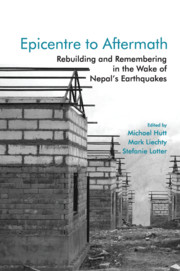1 - Reconstituting Pasts and Futures: Contextual Agency in a Disaster Aftermath
Published online by Cambridge University Press: 08 July 2021
Summary
[The earthquake] camejust as threats sometimes come,it wentjust as assurances vanish….
—Peshal Acharya, ‘Aagaman’ (Arrival), tr. Michael HuttDrawing together a range of scholars—from ethnographers to geographers, historians to literary critics, political scientists to art historians—this volume lays out a host of perspectives on Nepal's 2015 earthquakes that highlight the political, historical, cultural, artistic, emotional, temporal, embodied, and material dynamics at play. By approaching the 2015 disaster and its aftermath from multiple analytical and methodological perspectives, the book not only dramatically expands the field of knowledge relevant to this particular disaster, but also suggests a new way of approaching and understanding disasters more generally. Many studies of disaster aftermaths follow relatively narrow pragmatic approaches which view disasters as mainly technical or material challenges to be assessed and addressed by experts in relief and reconstruction. This volume pursues a more holistic approach—one that recovers the disaster aftermath as a lived human experience in which it is the disaster-affected people themselves, individually and collectively, who work to build new lives, sometimes with and sometimes against the efforts of the outsiders who come to assist them.
Epicentre to Aftermath captures the richly complex currents that were stirred up in the 2015 earthquakes’ aftermath. These include outpourings of grief, rage, and commemoration in poetry and song, artistic representation, documentation, and memorialization. With greater temporal distance from the event, pledged commitments turn into complex discourses about long-term visions and aspirations for society. They include debates over state intervention, bureaucracy, and corruption; questions of risk and the material and symbolic standards of reconstruction; and struggles over what constitutes and who owns the discourse over ‘heritage’, leading to questions about which pasts to rebuild and which futures to claim. In the disaster's aftermath, it is not just homes and other infrastructure that must be reconstructed. Even more challengingly, people must rebuild their lives and livelihoods, their senses of self, their families, their communities, their pasts and futures: in short, they must reconstruct the edifices of meaning that were profoundly affected by the disaster.
Information
- Type
- Chapter
- Information
- Epicentre to AftermathRebuilding and Remembering in the Wake of Nepal's Earthquakes, pp. 3 - 21Publisher: Cambridge University PressPrint publication year: 2021
Accessibility standard: Unknown
- 3
- Cited by
